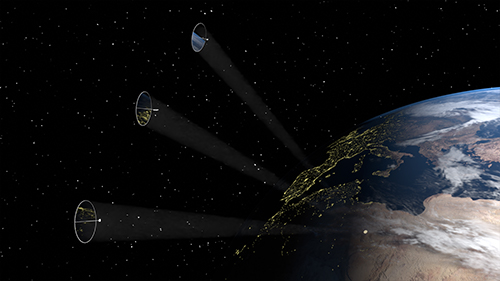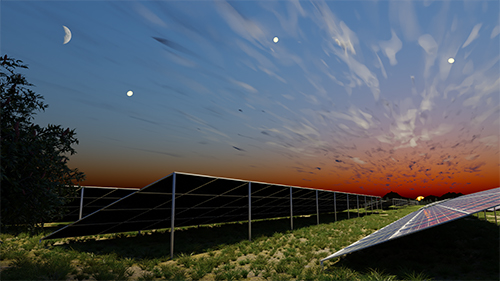Enhancing solar power generation from space
Developing new technologies to generate clean energy is one of the key engineering challenges of this century. The global demand for clean energy is urgent and growing rapidly. Technologies that may have seemed implausible or unnecessary in a world content with cheap and abundant fossil fuels may be required in the race to decarbonise our energy sources.
At the same time, the costs for delivering materials into space is falling and the technologies available to deploy in space are becoming more sophisticated.
These developments make it an opportune time to explore the potential for enhancing the production of clean energy using solar reflectors. These space-based reflectors would shine additional sunlight towards solar power farms.
This project ‘SOLSPACE: Enhancing Global Clean Energy Services Using Orbiting Solar Reflectors’, is led by Professor Colin McInnes. It is supported by a €2.5m ERC Advanced Grant for five years of research into new ways of maximising solar power generation.
It aims to devise, develop and demonstrate strategies for increasing the amount of energy produced by future large-scale solar power farms around the world.
This work will outline the potential benefits of creating a constellation of gossamer-thin satellite reflectors. The reflectors would redirect sunlight from orbit towards future large-scale solar power farms on earth at the start and end of each day, when consumer demand for power is at its peak but the output of solar farms is weakest.

Image: Representation of a train of mirrors reflecting sunlight to a solar power farm on Earth: in-orbit view. The mirror size is not to scale. Credits: Andrea Viale, NASA (Earth texture).
They are researching the most efficient orbits and control strategies for the reflectors, so that they can generate the maximum additional power on the ground while minimising the amount of stray light which reaches the earth.
The team are also investigating designs for the orbiting solar reflectors, how they can be manufactured and assembled and the economic impact of the additional energy delivered.
Alongside Professor McInnes, the themes of the project are being explored by four researchers:
Devising new families of reflector orbits (Dr Onur Çelik)
Reflector pointing control strategies (Dr Andrea Viale),
Reflector design and manufacture (Dr Litesh Sulbhewar),
Economic and energy systems analysis (Dr Temitayo Oderinwale).

Image: Representation of a train of mirrors reflecting sunlight to a photovoltaic farm on Earth: ground view. The mirror size is not to scale. Credits: Andrea Viale.
“The broad range of services delivered by the space sector are information-based; satellite navigation, telecommunications and Earth observation. However, the possibility of delivering energy from space offers entirely new opportunities for the future.
“The delivery of global clean energy services is one the key challenges for the 21st century. This project can help us to understand how space technology can contribute to the future of global energy services.”
Professor Colin McInnes

Discover more
- Professor Colin McInnes
- Space and Exploration Technology
- James Watt School of Engineering
Project funding
- €2.5m ERC Advanced Grant
Funders

